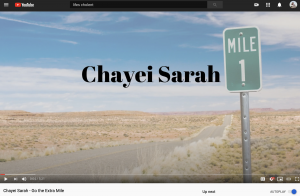This Week’s “Life’s Cholent” Video: Go the Extra Mile
How one young, modern-orthodox woman relates to the weekly Torah portion — Parsha Chayei Sarah
That’s one takeaway from this week’s edition of “Life’s Cholent,” the series of short videos hosted on YouTube by Avital Chaya, a young, modern-orthodox woman. Each week, Avital offers her take on how the Torah serves as a guidebook to help us navigate life’s many opportunities and challenges.
Watch Avital’s video here: https://tinyurl.com/LC-Sarah
“Life’s Cholent” is designed for anyone with a curiosity about Judaism but no formal Jewish education.
This week’s portion, known as the parsha, is the fifth of the Torah’s 54 instructional chapters. It is titled “Chayei Sarah,” translated from Hebrew as “The Life of Sarah.”
Abraham’s wife, Sarah, the mother of Isaac, dies at the age of 127 and is buried in the Cave of Machpelah in Hebron, Avital recounts.
In the wake of her passing, Abraham decides it’s time to find Isaac a wife. Toward that end, Abraham dispatches his most trusted advisor, Eliezer, to search for a suitable bride.
“Eliezer knows the type of woman who will become not only Isaac’s wife but also one of the matriarchs of the Jewish people,” Avital explains.
Eliezer’s yardstick is simple. Isaac’s wife-to-be need not be the daughter of royalty. Nor must she pass a litmus test of education and observance. Eliezer doesn’t even require Isaac’s future bride to live near Abraham and his son in the land of Canaan.
“All that mattered to Eliezer was that the woman he selects for Isaac would demonstrate the virtues of kindness, generosity, and humility,” Avital says.
Eventually, as Avital details in her video, Eliezer heads to the land of Abraham’s birth, along with his caravan of camels. Arriving at a distant water well, he waits.
“Among the maidens of the faraway land, Eliezer was on the lookout for that one special woman who would not only offer him water but also provide drink to his parched camels,” Avital says. “Sure enough, one young woman comes forth to greet Eliezer. She not only offers him water but even holds up the vessel so that he – a stranger, no doubt weary from his journey – doesn’t have to exert himself while drinking.”
The maiden’s consideration extended to Eliezer’s camels as well, and thus, Avital explains, Rebecca merited to marry Isaac.
What lesson does this ancient Torah portion provide us today? Avital asks.
“We can recognize in Parsha Chayei Sarah what counts most in a spouse,” Avital says. “Wealth comes and goes. Good people materialize from all walks of life, not just from the educated and advantaged. A profession is only a job; it isn’t a defining characteristic. And in the age of air travel and video conferencing, distance isn’t a barrier to finding one’s “bashert” – preordained match.”
In our era, there are no camels to water for strangers, Avital acknowledges. “But we can hold open a door for those who follow behind us. We can help an older adult carry his or her groceries to their car. We can welcome newcomers to our community and show them around. The possibilities of ‘watering their camels’ are endless.”
For women and men who are already married, Avital says they, too, can go the extra mile by doing something special, out of the ordinary, to bring joy to their loved ones.
“It will make you feel good and make them feel appreciated and loved,” she says. “These may be little gestures, but they go so far in creating a warm home environment.”
Anyone who is curious about Judaism but needs help understanding its relevance to our lives today is encouraged to watch the weekly “Life’s Cholent” videos, available on YouTube, and follow Avital on Instagram.
YouTube: https://tinyurl.com/lifescholent
Instagram: https://tinyurl.com/Instagram-LifesCholent
Coming next week, “Parsha Toldot – Understanding the Meaning.”
[About The Name: Cholent is a traditional Jewish stew that dates back to ancient Jewish communities. Typically, the dish is made of meat, potatoes, barley, beans, and kishke (a paprika-spiced stuffing). However, throughout the centuries, when Jews suffered periods of famine, cholent would contain whatever ingredients they could find and combine.
Cholent, most often consumed during Saturday lunch, is prepared on Friday and cooked overnight to avoid transgressing the biblical commandment not to prepare food on the Sabbath. By making it ahead of time and letting the mixture simmer overnight, observant Jews can still enjoy a hot meal the next day.
"Life's Cholent" plays on the notion of cholent being a Jewish dish and a mix of many different ingredients. Similarly, the video series is a savory blend of Jewish topics that are relevant to our modern lives.]
Avital Chaya
LIfe's Cholent
+1 303-296-1200
email us here
Visit us on social media:
Twitter
Legal Disclaimer:
EIN Presswire provides this news content "as is" without warranty of any kind. We do not accept any responsibility or liability for the accuracy, content, images, videos, licenses, completeness, legality, or reliability of the information contained in this article. If you have any complaints or copyright issues related to this article, kindly contact the author above.




